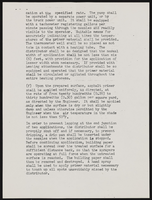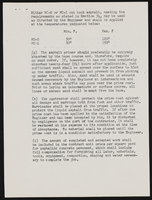Search the Special Collections and Archives Portal
Search Results
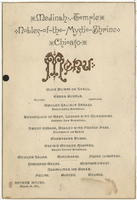
Nobles of the Mystic Shrine, Medinah Temple event menu, March 28, 1885, Revere House
Date
1885-03-28
Archival Collection
Description
Note: Nobles of the Mystic Shrine are commonly known as Shriners Restaurant: Revere House Location: Chicago, Illinois, United States
Text
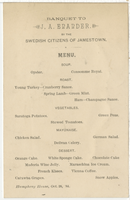
Menu for the banquet to J. A. Enander by the Swedish Citizens of Jamestown, October 28, 1884, at Humphrey House
Date
1884-10-28
Archival Collection
Description
Restaurant: Humphrey House Location: Jamestown, New York, United States
Text
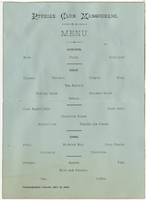
New Year Eve, Pythian Club Masquerade event, menu, December 31, 1884, at Thornburgh House
Date
1884-12-31
Archival Collection
Description
Restaurant: Thornburgh House Location: Laramie, Wyoming, United States
Text
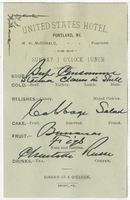
United States Hotel, lunch menu, Sunday
Date
1870 to 1933
Archival Collection
Description
Note: Menu partially handwritten Restaurant: United States Hotel Location: Portland, Maine, United States
Text
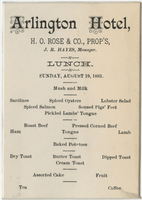
The Arlington House, lunch menu, Sunday, August 19, 1883
Date
1883-08-19
Archival Collection
Description
Restaurant: The Arlington Location: Petoskey, Michigan, United States
Text
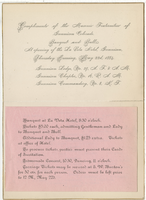
Invitation to a banquet and ball, Thursday evening, May 22, 1884, for the opening of the La Veta Hotel.
Date
1884-05-22
Archival Collection
Description
Note: Invitation includes the schedule of events, costs, instruction for event and carriage ticket procurement Menu insert: Event programs Restaurant: La Veta Hotel Location: Gunnison, Colorado, United States
Text
Pagination
Refine my results
Content Type
Creator or Contributor
Subject
Archival Collection
Digital Project
Resource Type
Year
Material Type
Place
Language
Records Classification



